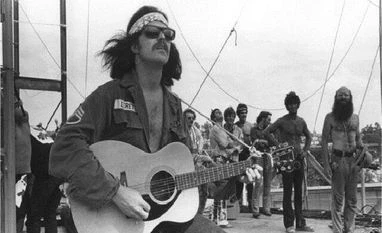It wasn’t just a rock festival though it was the culmination of all that symbolised the 1960s and its fleeting rebellion against the establishment and its conservative values, celebrating a new kind of music, the use and abuse of drugs, peace, love, and free sex. It rained, sometimes poured, intermittently through the festival, but that didn’t deter approximately 400,000 people from turning up, many of them staying through the entire celebratory festival.
The Woodstock festival was originally conceived by two New York City impresarios, who formed Woodstock Ventures in January 1969 to organise the show. After a number of false starts, the organisers found a venue in a farm owned by dairyman Max Yasgur in Bethel in upstate New York. Originally conceived as a paid-for concert/festival, the organisers, who had expected around 50,000 people to attend, were forced to make it free when tens of thousands of people began to descend on the venue days before the concert was to begin and when they realised that inadequate preparation time meant that fences, turnpikes and ticket booths could not be readied on schedule.
A galaxy of stars played at Woodstock. Among them, in no particular order, were Joan Baez, Richie Havens, Arlo Guthrie (son of Bob Dylan’s guru Woody Guthrie), and Ravi Shankar, playing on the first day, a Friday; Carlos Santana, Canned Heat, Janis Joplin, the Grateful Dead, Creedence Clearwater Revival (the first band to sign up), Sly and the Family Stone, The Who, Jefferson Airplane, Joe Cocker, and Ten Years After, playing on the second and third days; and, Crosby, Stills, Nash and Young, Paul Butterfield, and Jimi Hendrix, playing on Monday, added to the original three-day schedule, because of delays caused by the rain.
Woodstock would be the last time Joplin and Hendrix would play before a substantial crowd: both died in 1970.
Joni Mitchell wrote a song eponymously called “Woodstock” to mark the occasion. It was most famously performed by Crosby, Stills, Nash and Young, and began: “Well, I came upon a child of God/He was walking along the road/And I asked him, Tell me, where are you going/This he told me/Said, I'm going down to Yasgur's Farm/Gonna join in a rock and roll band/Got to get back to the land and set my soul free/We are stardust, we are golden/We are billion year old carbon/And we got to get ourselves back to the garden”.
The enthusiasm to join the festival caused massive traffic jams. Before getting going with his act, Arlo Guthrie announced, “New York Thruway’s closed man, can you believe it”, before singing “Coming Back to Los Angeles” onstage and “The Times They Are a-Changin’’, in a celebratory tenor. Ravi Shankar was less than impressed by the chaos, the Brownian movement of masses of people smoking dope, chasing heroin, and making love in the open. “They were having fun,” he complained in an interview, years after the event.
Crosby, Stills, Nash and Young began their turn, with a disclaimer of sorts. “This is the second time we’re playing in front of people, man”, Stills told the crowd “we’re scared shitless.” They went on to play for about an hour, singing, among other songs, “Suite: Judy Blue Eyes” and “Helplessly Hoping in an acoustic set”. In their electric set, without Young, they played “Wooden Ships” and the Young composition “Sea of Madness”.
One of the most popular performances was the one by Joe Cocker, who air-guitared his way through a rendition of The Beatles’s “With a Little Help From My Friends”, a cover version that is widely hailed as being significantly better than the original. Jefferson Airplane, fronted by the incomparable Grace Slick, began with a promise: “Alright friends, you have seen the heavy groups, now you will see morning maniac music, believe me, yeah... It's the new dawn...” They went on to sing, in a set of a dozen-odd songs, one of their most widely heard numbers, “White Rabbit”, and Crosby, Stills and Nash’s “Wooden Ships”.
Jimi Hendrix performed the coda on Monday morning, delayed by the rain and the general chaos, about which no one seemed to be bothering overmuch. He played for a couple of hours and played twenty-odd songs, including “Gypsy Woman”, “Voodoo Child”, “Purple Haze”, “Foxy Lady”, and, not for the first time, the American national anthem, “Star Spangled Banner”. Hendrix’s performance was later hailed by rock music fans and rock music historians as not just the defining performance of the Woodstock festival, but of the 1960s and rock music itself.
In the end, the 400,000-odd people who went to Yasgur’s farm did “enjoy themselves”, but it was not just enjoyment. It was a celebration of the spirit of the 1960s and of counterculture. It was a generation of people telling earlier generations that the times were not just a-changin’, they had changed and those who could not lend a hand had better get out fast.
To read the full story, Subscribe Now at just Rs 249 a month
Already a subscriber? Log in
Subscribe To BS Premium
₹249
Renews automatically
₹1699₹1999
Opt for auto renewal and save Rs. 300 Renews automatically
₹1999
What you get on BS Premium?
-
Unlock 30+ premium stories daily hand-picked by our editors, across devices on browser and app.
-
Pick your 5 favourite companies, get a daily email with all news updates on them.
Full access to our intuitive epaper - clip, save, share articles from any device; newspaper archives from 2006.
Preferential invites to Business Standard events.
Curated newsletters on markets, personal finance, policy & politics, start-ups, technology, and more.
Need More Information - write to us at assist@bsmail.in
)